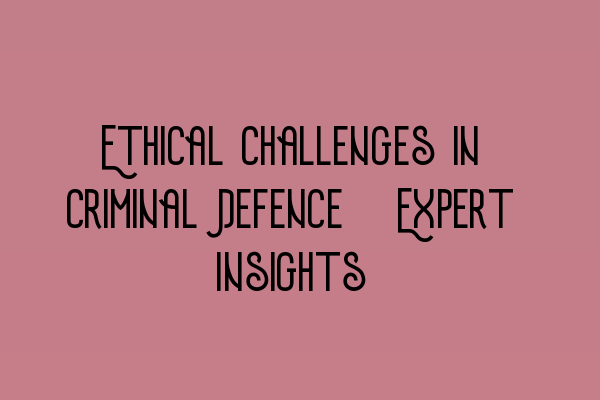Ethical Challenges in Criminal Defence: Expert Insights
In criminal defence practice, legal professionals often encounter complex ethical challenges that require careful consideration and expert insights. The nature of criminal cases, with potentially life-altering consequences for individuals accused of committing offences, demands a heightened level of ethical responsibility. In this article, we explore the ethical dimensions of criminal defence and shed light on key considerations that criminal defence solicitors must navigate.
The Duty of Confidentiality
One of the fundamental ethical principles in criminal defence is the duty of confidentiality. Solicitors are bound to protect the confidentiality of client information, which includes any communication between the solicitor and the client. This duty extends to all aspects of the case, ensuring that clients can trust their solicitors with sensitive personal details and legal strategies. The duty of confidentiality plays a central role in maintaining the trust and confidence of clients.
However, the duty of confidentiality can sometimes clash with other ethical considerations, such as the duty to disclose the truth or prevent harm. In certain circumstances, solicitors may need to disclose confidential information if it is necessary to prevent serious harm to others or to comply with legal obligations. Balancing the duty of confidentiality with other responsibilities can be a delicate and challenging task for criminal defence solicitors.
Conflicts of Interest
Criminal defence solicitors must navigate potential conflicts of interest to ensure they can represent their clients effectively and ethically. A conflict of interest arises when a solicitor’s personal, financial, or professional interests may compromise their ability to act in the best interests of the client. It is crucial for solicitors to identify and address conflicts of interest at the earliest stage of a case.
For example, if a solicitor has previously represented a witness or a co-defendant in the same case, they may face challenges in representing their current client objectively. In such situations, solicitors must take appropriate steps to avoid any conflict of interest and ensure that their primary duty remains to their current client. Adherence to strict professional ethics is essential to maintain the integrity of the criminal justice system.
Ensuring Access to Justice
Access to justice is a fundamental principle of criminal defence, ensuring that individuals accused of crimes have the right to a fair trial and legal representation. However, ethical challenges may arise when solicitors face limited resources or conflicting demands on their time and expertise. Striking a balance between providing quality representation and managing the practical limitations of caseloads can be demanding.
As criminal defence solicitors, it is crucial to continuously strive to provide effective and diligent representation to clients, regardless of the obstacles. This may involve taking on pro bono work, collaborating with other legal professionals, or advocating for policy changes to enhance access to justice. Balancing ethical obligations with practical considerations can contribute to a more equitable criminal justice system.
Conclusion
Ethical challenges in criminal defence require constant vigilance and careful consideration from legal professionals. Upholding the duty of confidentiality, navigating conflicts of interest, and ensuring access to justice are central to maintaining the highest ethical standards in criminal defence practice.
To learn more about the SQE Criminal Law & Practice, you may find the following articles helpful:
